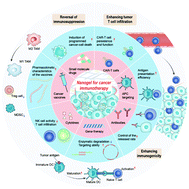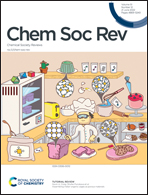Bioengineered nanogels for cancer immunotherapy
Abstract
Recent years have witnessed increasingly rapid advances in nanocarrier-based biomedicine aimed at improving treatment paradigms for cancer. Nanogels serve as multipurpose and constructed vectors formed via intramolecular cross-linking to generate drug delivery systems, which is attributed predominantly to their satisfactory biocompatibility, bio-responsiveness, high stability, and low toxicity. Recently, immunotherapy has experienced unprecedented growth and has become the preferred strategy for cancer treatment, and mainly involves the mobilisation of the immune system and an enhanced anti-tumour immunity of the tumour microenvironment. Despite the inspiring success, immunotherapeutic strategies are limited due to the low response rates and immune-related adverse events. Like other nanomedicines, nanogels are comparably limited by lower focal enrichment rates upon introduction into the organism via injection. Because nanogels are three-dimensional cross-linked aqueous materials that exhibit similar properties to natural tissues and are structurally stable, they can comfortably cope with shear forces and serum proteins in the bloodstream, and the longer circulation life increases the chance of nanogel accumulation in the tumour, conferring deep tumour penetration. The large specific surface area can reduce or eliminate off-target effects by introducing stimuli-responsive functional groups, allowing multiple physical and chemical modifications for specific purposes to improve targeting to specific immune cell subpopulations or immune organs, increasing the bioavailability of the drug, and conferring a low immune-related adverse events on nanogel therapies. The slow release upon reaching the tumour site facilitates long-term awakening of the host's immune system, ultimately achieving enhanced therapeutic effects. As an effective candidate for cancer immunotherapy, nanogel-based immunotherapy has been widely used. In this review, we mainly summarize the recent advances of nanogel-based immunotherapy to deliver immunomodulatory small molecule drugs, antibodies, genes and cytokines, to target antigen presenting cells, form cancer vaccines, and enable chimeric antigen receptor (CAR)-T cell therapy. Future challenges as well as expected and feasible prospects for clinical treatment are also highlighted.



 Please wait while we load your content...
Please wait while we load your content...